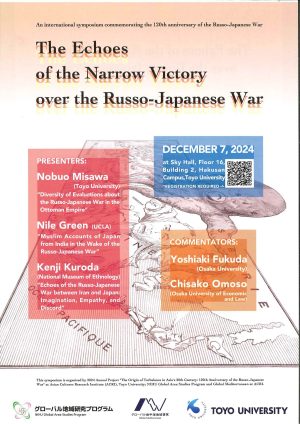2024年12月7日開催International Symposium“The Echoes of the Narrow Victory over the Russo-Japanese War(「日露戦争“辛勝”の残響」)”【終了しました】 | 一般社団法人日本・トルコ協会 | The Japan-Türkiye Society一般社団法人日本・トルコ協会 | The Japan-Türkiye Society
2024年12月7日開催
International Symposium
“The Echoes of the Narrow Victory over the Russo-Japanese War(「日露戦争“辛勝”の残響」)”
東洋大学アジア文化研究所より国際シンポジウム(英語のみ)開催のご案内をいただきましたのでご案内致します。
プログラムなどの詳細は以下をご参照下さい。
https://sites.google.com/toyo.jp/globalmediterranean/activities/231207echoesofvictory
– – – – – – – – – – – – – – – – – – – – – – – – – – – – – – – – – – – – – – – – – – – – – – – –
テーマ:国際シンポジウム「日露戦争”辛勝”の残響」
本拠点は、国際シンポジウム「日露戦争”辛勝”の残響」を東洋大学アジア文化研究所と共同開催いたします。
2024年は日露戦争開戦の年から120年にあたります。ロシア革命の勃発とアメリカの仲介により、日本は辛くも勝利を手にしましたが、このことは、列強の支配下におかれた世界中の人々に独立への希望を与えることにもなりました。日本の辛勝を受け、各地で多くの著作が編まれると同時に、出身地の内外で独立運動を活発化させる人々が現れました。
本シンポジウムでは、日露戦争の辛勝の残響として、イスラーム圏の三つの地域の史料に見られるこのような反応に光を当てます。世界情勢がますます混迷を極める現在の視点から、日本の勝利という歴史的事件がその後のグローバルヒストリーにあたえた影響を振り返ります。
※本シンポジウムは全て英語で行われます。
日時・会場:12月7日(土)13:30開始
東洋大学白山キャンパス 2 号館16階スカイホール
要事前登録:https://forms.gle/gheYbADcKDf5x4959
上記リンクよりご登録の上、白山キャンパス学外者入構証を取得して下さい。
主催:東洋大学アジア文化研究所2024年度研究プロジェクト:日露戦争開戦120周年記念「20世紀アジア激動の発端」
人間文化研究機構グローバル地域研究推進事業グローバル地中海地域研究東洋大学アジア文化研究所拠点
Theme: “The Echoes of the Narrow Victory over the Russo-Japanese War”
The year 2024 marks the 120th anniversary of the opening of the Russo-Japanese War. With the unexpected outbreak of the Russian Revolution and American mediations between two countries, Japan barely managed to win the war. This narrow Japanese victory reverberated around the world, offering a glimmer of hope for independence to those under Western domination. Inspired by Japan’s triumph, some produced numerous literary works reflecting this hope, while others began actively pursuing independence, within and beyond their communities.
This symposium, drawing on documents from three Muslim communities, seeks to illuminate these responses and activities as echoes of Japan’s narrow victory. In light of today’s increasingly volatile global landscape, we aim to revisit how the world reacted to this historic event and its impact on the trajectory of global history.
Time and Venue: December 7, 2024 (Saturday), Start at 13:30
Sky Hall, Floor 16, Building 2, Hakusan Campus, Toyo University
Presenters:
13:30 | Nobuo Misawa (Toyo University)
“Diversity of Evaluations about the Russo-Japanese War in the Ottoman Empire”
It is true that Japanese narrow victory in the Russo-Japanese War in 1905 was widely publicized in the Ottoman Empire as a great surprise. However, there is almost no mention of the evaluation at the beginning of the Russo-Japanese War in 1904. Even today, many Japanese believe that the Ottoman Empire, which was hostile to Russia, supported Japan, based on the simple logic that “the enemy of my enemy is my friend.” The Ottoman Empire and the Ottoman Army sent Pertev Pasha, a military officer as the spectator of the war. When the war ended, various articles appeared in newspapers and magazines and several books were published in the Ottoman Empire. However, it should not be overlooked that the Ottoman Empire at that time was as much wary of Great Britain as it was of Russia as a European Great Power attempting to invade the Ottoman Empire. The old memories of the Tragedy of Ertugrul Frigate in 1890 have long since faded, and the Anglo-Japanese Alliance in 1902, concluded two years before the start of the Russo-Japanese War, aroused discomfort and wariness toward Japan. Japanese were so pleased with the Anglo-Japanese alliance that they are unaware of the negative effects of this alliance. This presentation introduces the diversity of evaluations of the Russo-Japanese War in the Ottoman Empire and reexamines the echo of the narrow victory in the war.
14:00 | Nile Green (University of California, Los Angeles)
“Muslim Accounts of Japan from India in the Wake of the Russo-Japanese War”
Thanks to the pioneering and scrupulous investigations of Turkish and Japanese researchers (particularly MISAWA Nobuo), the impact on the late Ottoman Empire of the rise of Meiji Japan—and the Japanese victory against Russia in 1905, especially—is now well-established. We also know a good deal about the underlying role of print communications in mediating and disseminating the positive picture of Japan that spread through the Ottoman Turkish, and broader Arab, public sphere in the following years. However, less is known about parallel developments among the Muslims of colonial India (and adjacent Afghanistan). While some attention has already been paid to the impact of Japan on English-speaking, Indian Hindu and Buddhist activists— especially those associated with the ideology of Pan-Asianism—very little research exists on the publications about Japan in Urdu and Persian that appeared from the booming printing presses of colonial India. This paper therefore provides a survey of a range of such publications, in Persian as well as Urdu, which appeared in a variety of literary and informational genres.
By placing these texts into their informational contexts, the papers shows that the celebratory ‘“Japanophilia” voiced in these publications was not necessarily accompanied by a Muslim “Japanology” in terms of the ability of Muslim intellectuals based in India to read Japanese or otherwise draw on direct sources of information. This in turn points us to the mediated character of much Indian Muslim discourse on Japan, particularly when authors attempted to move beyond reportage on outward appearances or contemporary events and instead to examine Japanese history, literature, religion, or culture. Furthermore, when Indian Muslim authors were able to describe for example Buddhism or Shinto— even if by relying on European sources—these non-Muslim religions sometimes presented problems in situating Japan as a role model for Muslim empowerment. In this way, we will see that the legacy of the Russo Japanese war among South Asian Muslims was complex, multivalent and sometimes contradictory.
15:15 | Kenji Kuroda (National Museum of Ethnology)
“Echoes of the Russo-Japanese War between Iran and Japan: Imagination, Empathy, and Discord”
Following the dispatch of the official delegation from the Meiji government to Iran in 1880, it took almost half a century until formal diplomatic relations between Japan and Iran were established in 1929. During this period, not only were diplomatic relations between the two countries being considered, but there was also a growing mutual interest among the intellectuals of the two countries occasionally. In particular, the Russo-Japanese War in 1904, which broke out concurrently with the constitutional revolution that commenced in Iran in 1906-1911, had a profound impact on mutual intellectuals, engendering a plethora of imaginations and sympathies. However, the military victory of the Russo-Japanese War, which elevated Japan to the status of the Empire of Japan as a lagging empire, gave rise to discord at the national level. Then, this paper will examine the impact of the Russo-Japanese War on bilateral relations in the modern era, with a particular focus on the contributions of intellectuals in both countries, as well as the Japanese military intelligence activities and diplomatic negotiations between Japan and Iran around the Russo-Japanese War.
Commentators:Yoshiaki Fukuda (Osaka University)
Chisako Omoso (Osaka University of Economic and Law)
Registration Form: https://forms.gle/gheYbADcKDf5x4959
Organized by: 2024 Annual Project “The Origin of Turbulence in Asia’s 20th Century:
120th Anniversary of the Russo-Japanese War” at Asian Cultures Research Institute (ACRI), Toyo University
NIHU Global Area Studies Program and Global Mediterranean at Asian Cultures Research Institute (ACRI), Toyo University






